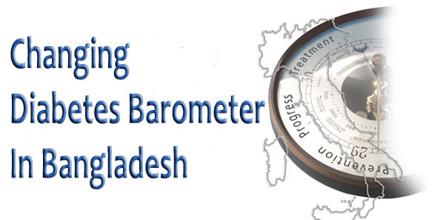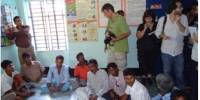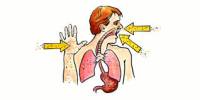Bangladesh is a densely populated country situated at South- East Asia. Although the geographical area of the country is not that big, but the country is huge (8th in the world) in terms of the population (close to 160 million). Considering diabetes under the health sector, 5.9 million people have diabetes today and that would rise to 16.6 million by 2030. Per capita health expenditure is 152 DKK which is 3.7% of the GDP. To combat the disease, groups and institutions are serving through different public and private hospitals. Besides, Diabetes Association of Bangladesh (BADAS) is playing a crucial role. Everyday more than 12,000 patients are served by them through different DAB centres, National Health Care Network (NHN) centres, Health Care Development Project (HCDP) centres around the country. This altogether constitutes a complete and integrated diabetes care management system in the country. Having this world class diabetes care infrastructure in place, only 25% patients have access to treatment and within that 25% also the treatment outcome needs further improvement. There is an urgent need for change, which can be brought in through the Changing Diabetes® Barometer (CDB) and Novo Care Project.
Introduction
The pharmaceutical industry in Bangladesh is one of the most developed and technology intensive sector which has an immense contribution to the national economy. Bangladesh Pharmaceutical Industry is now heading towards self-sufficiency in meeting the local demand. The industry is the second highest contributor to the national exchequer after garments. The pharmaceutical industry is worth around 1,500 million USD in Bangladesh, which has more than 250 companies of which 200 run their own manufacturing facilities including six out of the ten multinationals. Nearly 85 % of the domestic requirement is met by the top 20 companies and almost 95 % of the requirements are met by locally manufactured medicines. Diabetes Care in the country is highly organized courtesy of Diabetic Association of Bangladesh (DAB). It is a non-profit voluntary socio-medical service organization, the largest healthcare provider among the private and non-government organizations. Diabetes and Prediabetes prevalence in Bangladesh is around 19 million. Diabetes Association of Bangladesh (DAB) has piloted one of the largest health program in the world following Public-Private and Private-Private partnership model. DAB has nearly 25% of diabetic population enrolled in their network of nearly 145 healthcare facilities and are currently treating 14,000 out-patients. BIRDEM hospital treats over 3500 patient’s everyday making it the world’s largest diabetes care centre. The top 10 pharmaceutical companies in Bangladesh are Square, Incepta Pharma, Beximco, Opsonon, Renta, Eskayef, Aristpharma, ACI, Acme, and Healthcare. Top five multinational pharmaceutical companies in Bangladesh are Sanofi Bangladesh, Novo Nordisk, GlaxoSmithKline, Novartis and Sandoz. Novo Nordisk is a global healthcare company with 90 years of innovation and leadership in diabetes care. The company also has leading positions within Hemophilia care, Growth hormone therapy and Hormone replacement therapy. Headquartered in Denmark, Novo Nordisk employs approximately 40,300 employees in 75 countries, and markets its products in more than 180 countries. A world leader in Diabetes since 1923, Novo Nordisk has production facilities present in 7 countries. Novo Nordisk has been commercially active in Bangladesh for more than half a century, selling insulin in the country since 1957. In 1999 liaison office of Novo Nordisk A/S was set up in Dhaka in2004. Till March 2006, the liaison office ran its operation through one sole 2 distributor International Agencies, Bangladesh and it was responsible for registration, sales activities, storage as well as distribution.In April 2006, Transcom Distribution Company Ltd (TDCL) was made the sole distributor and was responsible for registration, sales and distribution of the products. In January 24th 2007, Novo Nordisk Pharma Pvt Ltd was set up with its headquarters in Dhaka. At present, the company has about 60 per cent share in Bangladesh insulin market. In Bangladesh, Novo Nordisk has been actively supporting healthcare system strengthening through physician education, infrastructure development and affordability improvements. The value to the Bangladeshi society is reflected in higher rates of diagnosis, treatment initiation and improved overall quality of diabetes care in the country. For more than 50 years, Novo Nordisk has been the leader in diabetes care in Bangladesh and has a historical long partnership with the Diabetic Association of Bangladesh (DAB) and committed to fight against the disease together. In Bangladesh, Novo Nordisk broaden HCP knowledge about diabetes through the Distance Learning Programme (DLP); make medications affordable through LDC pricing policies; it ensure that treatment for children is accessible and affordable through the Changing Diabetes in Children Programme (CDiC); and increased the availability of high-quality medication by improving the distribution chain. The vast majority of Novo Nordisk insulin’s are imported from its plants in Denmark and France supported by its strong and wide supply chain network globally. Only a small proportion of its Human Insulins are produced locally upon a partnership agreement with Eskayef Bangladesh ltd in a high-tech insulin manufacturing plant since December 2012.
Bringing difference through Changing Diabetes Barometer (CDB)
Bangladesh is a densely populated country situated at the South East Asia region. Although the geographical area of the country is not that big, but in the terms of population, the country is 8th largest in the world with a population close to 169 million. Considering diabetes under the health sector, 7.1 million people have diabetes today which is estimated to rise to 16.6 million by 2030. The per capita health expenditure in Bangladesh is one of the lowest in the world with 5.5 % of the GDP. In order to combat the disease, people are serving through different public and private hospitals. In the fight against Diabetes, the Diabetes Association of Bangladesh (BADAS) is playing an extremely critical role in the country. Everyday around the country more than 12,000 patients are served by them through different DAB centers, National Health Network (NHN) centers and Health Care Development Project (HCDP) centers. This altogether constitutes a complete and integrated diabetes care management system in the country.
PURPOSE OF CDB
In spite of this, more than 25% of diabetes patients are deprived of getting proper treatment in the country. Additionally half of the total diabetes patients are still undiagnosed. All these lead to ultimately cost 129,313 lives in 2015. In the health sector, diabetes is running like a race with no holds bar. So there is an urgent need for change, which can be brought in through the Changing Diabetes® Barometer (CDB) project. Under this project, the prime target is to provide diabetes care management to more patients through providing more support to train-up HCPs, establishing more improvised and automated registry system in the centres and ultimately to ensure the best treatment to more patients. At present diabetes management system in Bangladesh is not fully equipped with an automated registry system. So there always lacks an opportunity to track down the treatment pattern and the number of patients. By incorporating the full-fledged and automated registry support it is possible to measure the quality of treatment pattern and patient history.
STRATEGIC REASONS
Novo Nordisk Bangladesh has always been working for the betterment of the patients with diabetes. Through participating and initiating different programs, strategies and campaigns it has tried to help BADAS to develop a comprehensive structure of the diabetes management system. BADAS has taken the target to reach at least 50% of the patients by 2020. It can only be possible when people will be more aware to screen and diagnose their diabetes condition. In collaboration with BADAS, Novo Nordisk Bangladesh is working together on that objective.
Under this strategy –
More awareness programs are initiated and conducted throughout the country
- Free of cost blood glucose screening and HbA1c screening (for patient with high BG) are provided
- Automated patient registry system is being established in the centres to retain complete patient data
- In collaboration with diabetes management centres, insulin help desk corner is incorporated to provide support to the new insulin users
- These initiatives are providing from three perspectives- Patients, Doctors and Diabetes management centers.
For Patients:
- Run diabetes awareness program in selected geography of the country to raise consciousness of the patients
- Make patient aware about diabetes, its complications and importance of good glycaemia control
- Support HCPs training on diabetes management, life-style modification and insulin intake
- Free blood glucose screening camp & HbA1c screening for patients with high BG
For Doctors:
- Training of HCPs on quarterly & monthly basis to provide enhanced update on better glycaemia control
- Make the HCPs aware that early insulin intake is vital for enhanced diabetes management
For diabetes management centres:
- Provide support to create computer based patient registry database.
- Insulin Help Desk Corner helps to counsel patients on any queries
Before Changing Diabetes Barometer project, no patient registry system was present in the centres. Diabetes centres only provided a history book to the patients which patients used to bring with them during each visit. So it was difficult for both the doctors and centres to retain any documented patient data. It was really very challenging for the doctors to monitor the progress of their patient. The automated registry system was able to retain all the patient data from the initiation to the patient treatment. As a result, doctors can track down the information of all of his/her patients with their progress pattern and can change the treatment process as per requirement. The doctors can also find out how many patient he has treated and which treatment protocol is better for good glycaemia control. The centres will also be benefitted from this registry system as it will have a complete patient database. Depending on that, the centres can take necessary measures for infrastructural development and necessary improvement. From all these measures, the patient will ultimately receive the best treatment. The patient will not be required to carry the history book during every visit to the doctor. To conclude, the registry system is a landmark for the development of diabetes treatment. Through the triple way drive, the automated registry system will eventually bring in the change in the diabetes management of Bangladesh.
CHALLENGES INVOLVED
Novo Nordisk started to work on this project from October 2014. The development works continued up to January 2015. In this time period, it was launched as a pilot project in one of the selected centre (Mirpur NHN). On initial phase, Novo Nordisk selected 20 centres around the country. Finally, it was launched in full phase on 7th February 2015. Till now the project has been initiated in over 30 centres across the country. There are lots of activities involved in the project, where different kinds of logistics support are required to provide in the centres including the automated registry system.
IMPACT OF CDB
Income levels of Bangladeshis are generally very low. They usually do not go for comparatively high cost diagnosis experiments like- HbA1c. So in most of the cases, doctors cannot track down actual blood glucose level of their patients. Under the CDB project, patients are getting free of cost HbA1c measurement opportunity. So it ultimately helps the
doctor to choose right treatment option and the patient will also get more accurate treatment regimen for better glycogenic control. Through CDB monitoring the number of HbA1C done previously have become easy after incorporating this free test facility. It will also help to track down the prescription habit of the doctors, whether they prefer human insulin or modern insulin for their patients and to how much extent they prefer to switch from human to modern insulin or choose to provide modern insulin in early initiation. Due to this project the number of HbA1c test has risen significantly in the centers. Both doctors and patients are getting more accurate information on glycogenic control. Number of modern insulin users in early phase of treatment has increased and it ultimately puts a positive impact on the number of total insulin users. At present Novo Nordisk intends to launch the project further in other regions of the country, which will be eventually expanded to 130 centers. This project will ultimately contribute to the health and socio-economic condition of the country as well. Firstly, more people will come under the umbrella of diabetes diagnosis through free campaigns. It will ultimately help them to get better treatment. Moreover, there will be no extra cost burden on the patients for their diagnosis. Hence free blood glucose screening and HbA1c campaign will help the country in terms of both socio-economic and health perspective. This program is under the category C of GCN awards. In this category Changing Diabetes® is a common phenomenon. But this program intends to change diabetes and also the development of the country as a whole. So this is a program that has the ability to make a positive impact on a financial, social and environmental scale. This distinctive program can be adapted by other GCN members because it will be helpful for their people also.
Project Organogram
The project steering committee of CDB is comprised of the Project Leader, Mr Sukanta Das (SKDS), Project Coordinator, Ms Nazmun Peya, Sub Project Partner Mohammed Saiful Islam (MXDI) Sub Project Partner Pharmacovigilance Ms Fahima Hassan (FIAL), Sub Project Partner Operations Mohammed Zubair Matin (MMZB), Sub Project Partner Legal Ms Tasnuva Shelly (TSY), Sub Project Partner Islam Mohammed Saiful (MSFU), Sub Project Partner Market Access Ms Farjana Ehsan (FJEH) and Mr Gazi Tawhid Ahmed (GTWA). Recruitment and Training Partner includes Head of Human Resources Ms Noomaya Azad and HR Executive Mr Hamza Hemal.
An integrated approach that ensures highest standard service
Novo Nordisk Bangladesh has always been working for the betterment of the patients with Diabetic association. Through participating and initiating different programs, strategies and campaigns it has tried to help BADAS to develop a comprehensive structure of the diabetes management system. It is well established that, better HbA1c control is associated with long term health benefits. Every 1% drop in HbA1c results in-
- 43% reduction in lower extremity amputation or fatal peripheral vascular disease
- 37% less chance of micro vascular disease
- 19% reduction in cataract
- 16% decrease in heart failure
- 14% lessening of myocardial infarction
- 12% lower chance of stroke
So, control of HbA1c at optimal level is so important for overall wellness of the patients. Under Changing Diabetes® Barometer in Bangladesh, the prime target is to provide diabetes care management to more patients through Diabetic Association by providing more support to train-up HCPs, establishing more improvised and automated registry system in the centres and ultimately to ensure the best treatment to more patients.
Contribution to the society:
CDB is a kind of project, through which more people will come under the umbrella of diabetes diagnosis through free campaigns. It will ultimately help them to get better treatment. Moreover, there will be no extra cost burden on the patients for their diagnosis. Specially, HbA1c is a costly test, which is not always feasible for patients to financially partake. That is why free HbA1c blood glucose screening will help the country in terms of both socioeconomic and health perspective From all these measures, the patient will ultimately get the best treatment for himself. The patient will not be even required to carry the history book during every visit to his/her doctor. In a phrase, the registry system will be a landmark for the development of diabetes treatment. Through the triple way drive, the automated registry system will eventually bring in change in the diabetes management of Bangladesh.
NovoCare (For high valued insulin users in Bangladesh)
NovoCare is an exclusive Patient Support Program, an initiative of Novo Nordisk Bangladesh and powered by SSL for high end insulin users. Typically the center acts as the first contact and principal point of continuing care for patients. For the first time, doctors directly speak and provide value added services to the patients& monitor them at regular basis. It can be proceeding in 2 phases:
Phase 1:
- Anytime access to doctors and doctor-call-back service; (Patients can directly engage with the doctors anytime while dedicated doctors are available who serves the patients according to their needs)
- Electronic personal medical record; (Treatment related all the data will be digitally recorded )
- Patient’s access to online personal health record through the Internet; (A web site will be developed and the patients can be able to show their treatment profile & regular treatment update through internet by accessing that web site )
- Mobile phone applications will be installed for daily blood glucose, blood pressure, weight and HbA1c record keeping; ( Initially a patient can monitor or update their profile through mobile viewable website)
Phase 2:
- Online access to patient’s record for Medical Consultants, Endocrinologists and Dialectologists only for their respective patients
- Graphical representation of patients progress in concert with usage of insulin;
- Reminder to take medications, purchase drugs, diabetes supplies, etc.
Objectives for insulin user Support Program:
- Establish ease-of-use and convenience around insulin Users (initiation and use) amongst HCPs and patients.
- Provide a value-added patient program to differentiate and reinforce commitment to Diabetes.
- Give patients an opportunity to receive additional training and support in administration of the modern device.
- To increase the patient compliance and adherence to therapy and thereby reducing long term complication
Support patients with:
- Education: Arrange monthly patient awareness program to educate the patients about their disease, prevalence, remedies & treatment.
- Reminders: Always follow up the patients concerning their treatment & diagnosis.
- Injection + Medication Alerts
- Intensive support during first 2 weeks to prevent drop-outs: When a new patient is enlisted, in the first two weeks the team monitors the patient in a bi weekly basis to prevent drop out cases.
- Doctor Call Back: In a regular basis, the responsible doctor monitors their patient over phone.
Target Audiences:
Primary care Physician & their administrative assistants, Endocrinologist, General practitioner and most importantly insulin users are the targeted audience.
NovoCare Process:
NovoCare was launched on 20th April, 2015
Three processes of patient enrollment:
- Online: Medical call center staff does the follow-up data collection over phone
- Via Physician office using online or paper form
- Via calling the hotline number
The patient registration form will include acopy of patient’s prescription
The Role of the Health Care Professionals in Novo Care:
- Inform patients about the insulin user Support Program including Executive care program
- Enroll patient by completing enrolment form and fax in or by providing patient’s contact number to NovoCare
- Hand out patient brochure with attached device guide together with prescription
- To extend follow-up support to medical call center doctor via phone, when necessary
The project steering committee of Novo Care is comprised of Project Leader, Mr Sukanta Das (SKDS), Sub Project Owner Ms Quamsia Sultana (QSUL), Sub Project Lead Ms Nazmun Peya, Sub Project Partner Mohammed Saiful Islam (MXDI), Sub Project Partner PharmacovigilanceMs Fahima Hassan (FIAL), Sub Project Partner Operations Mohammed Zubair Matin (MMZB), Sub Project Partner Legal Ms Tasnuva Shelly (TSY), Sub Project Partner Islam Mohammed Saiful (MSFU), Sub Project Partner Market Access Ms Farjana Ehsan (FJEH) and Mr Gazi Tawhid Ahmed (GTWA). Recruitment and Training Partner includes Head of Human Resources Ms Noomaya Azad and HR Executive Mr Hamza Hemal.
CONCLUSION
Novo Nordisk is a global healthcare company with 89 years of innovation and leadership in diabetes care. The company also has leading positions within hemophilia care, growth hormone therapy and hormone replacement therapy. Novo Nordisk strives to conduct its activities in a financially, environmentally and socially responsible way. The strategic commitment to corporate sustainability has brought the company onto the centre stage as a leading player in today’s business environment; recognized for its integrated reporting, stakeholder engagement and consistently high sustainability performance. Through the Changing Diabetes Barometer and NovoCare project, Novo Nordisk BD pharma believes it can provide a positive contribution to the diabetes population of Bangladesh by investing in infrastructures and resources that would aid physicians and health care professionals to track its patient’s condition make informed prescriptions backed by good quality data.
















